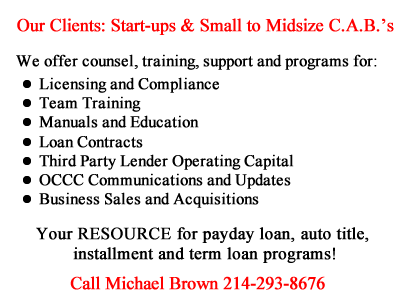OCCC is having a special stakeholder meeting on the questions posed to the Attorney General recently about CSO’s.
See below for a recent email sent out to OCCC stakeholders:
“On December 9, 2019, at 2:30 p.m., the OCCC will hold a stakeholder meeting on credit services organizations and attorney general opinion KP-0277.
A stakeholder meeting notice is available at: https://occc.texas.gov/publications/attorney-general-opinions. On this webpage, click the link labeled “Stakeholder Meeting Notice.” The meeting notice provides additional details and questions on which the OCCC is seeking input.
Stakeholders are invited to attend the meeting in person at the Finance Commission Building, or to listen and participate through an online webinar. To listen or participate online, please follow the instructions available at: https://attendee.gotowebinar.com/register/3659168503230489611
The OCCC will accept comments and suggestions on the questions in the meeting notice until December 12, 2019, at 5:00 p.m.”
OCCC is asking stakeholders for comments and suggestions on the topics below:
1. Does the opinion’s analysis affect the regulatory landscape for CAB transactions (i.e., deferred presentment transactions and motor vehicle title loans)?
2. Must persons engaged in non-CAB transactions comply with all requirements of Chapter 393 other than those that apply specifically to CABs (i.e., Section 393.201(c), Subchapter C-1, Subchapter G)?
3. Are persons engaged in non-CAB transactions subject to the enforcement authority of the attorney general under Section 393.502?
4. Are persons engaged in non-CAB transactions subject to local ordinances and the enforcement authority of local governments?
5. Are persons engaged in non-CAB transactions subject to federal law and the enforcement authority of federal agencies (e.g., the Consumer Financial Protection Bureau, the Federal Trade Commission)?
6. Sections 14.101 and 14.201 of the Texas Finance Code give the OCCC authority to investigate and enforce violations of Chapter 393 with respect to a credit access business. What is the proper role of the OCCC in light of the opinion?
7. Section 393.602 of the Texas Finance Code says a person may not use a device, subterfuge, or pretense to evade the application of Chapter 393, Subchapter G. Under the opinion, what would constitute a device, subterfuge, or pretense to evade the application of Chapter 393, Subchapter G?
8. Section 393.303 of the Texas Finance Code says a credit services organization may not charge or receive from a consumer valuable consideration solely for referring the consumer to a retail seller who will or may extend to the consumer credit that is substantially the same as that available to the public. Under the AG opinion, what would constitute a violation of Section 393.303?
9. Does the opinion’s analysis raise other significant policy issues?
10. Should the OCCC and the Finance Commission engage in rulemaking related to any of these issues? If so, what is the statutory basis for the rulemaking?
This blog post was written by Michael Brown, President of CAB Consulting and the Texas Organization of Financial Service Centers. He can be reached at 214-293-8676, or Michael@CreditAccessBusiness.com.
